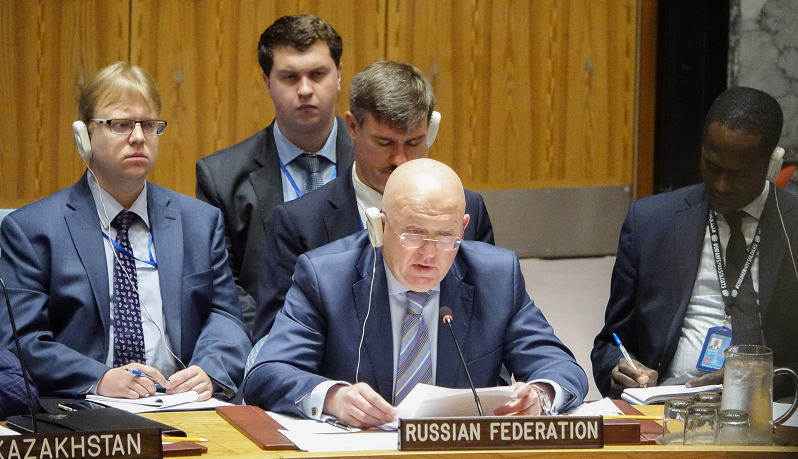Statement by Ambassador Vassily A. Nebenzia, Permanent Representative of the Russian Federation to the United Nations, during the UN Security Council meeting on the situation concerning the Democratic Republic of the Congo
We welcome the participation in today’s meeting of Mr. Léonard She Okitundu, Vice-Prime Minister and Minister for Foreign Affairs and Regional Integration of the Democratic Republic of the Congo.
We would like to thank the Chair of the Committee established pursuant to resolution 1533 (2004) for his detailed briefing on the Democratic Republic of the Congo sanctions regime. We greatly appreciate his leadership of the Committee and share his assessment of what is happening in the Democratic Republic of the Congo and the Great Lakes region. We support his proposal for visiting the country and the region at the end of October. Similar visits have already shown the relevance of that practice.
We would like to express our sincere condolences and sympathy to the family members of Michael Sharp and Zaida Catalán present here today. They gave their lives while fulfilling their mission in the name of a goal they sincerely believed in — that their work could bring peace to a conflict-torn African country.
We believe that their killers and all who were involved in that barbarous incident will be found and punished as they deserve, while we, in memory of Michael and Zaida, should redouble our efforts in working for peace in the Democratic Republic of the Congo.
Sanctions are an important element in the Security Council toolkit. However, such restrictions cannot and should not be an end in themselves. Their job is to help to achieve the political and diplomatic settlement of a conflict.
We share the concerns about the worsening situation in the Kasaï provinces, where the escalating confrontation between the authorities and armed tribal groups is alarming.
There can be no question that the Government and the United Nations Organization Stabilization Mission in the Democratic Republic of the Congo should take additional steps to mitigate the situation.
However, we would like to warn against any sweeping attempts to blame the Congolese military and police for everything that is happening through an alleged disproportionate use of force. It is the members of the opposition Kamuina Nsapu sect who are responsible for the attacks on Government officials, schools and polling stations and the recruitment of child soldiers. Of course, that should not be an excuse for human rights violations by any of the parties, who should rather await the results of the authorities’ official investigation
In our view, it is crucial to ensure that all the Congolese parties consistently implement the comprehensive political agreement of 31 December 2016, if stability is to be maintained in the Democratic Republic of the Congo. However, we would like to note that the modalities of its implementation, as well as any possible corrections to the timing of the elections, are the exclusive prerogative of the Congolese people and should be addressed only through a dialogue between the authorities and the opposition without any outside interference.
We agree with the opinion of Egypt’s Permanent Representative that the illegal exploitation of natural resources continues to be one of the main challenges facing not just the Democratic Republic of the Congo but the entire Great Lakes region.
And while the financial fuelling of insurgents through this kind of activity is steadily declining, it is essential to ensure that the countries of the region can consolidate their efforts to come up with realistic ways of dealing with the problem. We see good potential in this area for the 1533 Committee’s work.
We noted the timeliness of the 1533 Committee’s open meeting on 4 August and commend Egypt’s efforts in organizing it. At the meeting we looked at the statement by the representative of the Democratic Republic of the Congo that the United Nations Mission issued a fraudulent certificate of conformity for exporting Congolese gold, in contravention to the certification procedure for exporting precious metals out of the country. We hope that this issue will be comprehensively investigated.
We took note of the summary in the report circulated to the Council on 15 August (see S/2017/672/Rev.1) on the work of the United Nations Board of Inquiry into the death of the sanctions experts. We would like to draw attention to its first recommendation, which supports the idea of conducting a transparent and comprehensive criminal investigation under the jurisdiction of the authorities of the Democratic Republic of the Congo and with the support of Member States. We have been in favour of that format from the very beginning. Our optimism is buttressed by the attitude from Kinshasa, which is already cooperating with the United States investigation and is prepared to do the same with Sweden’s representatives.
Lastly, we would like to comment on one of the Group of Experts’ recommendations, about extending its mandate by a year and a half owing to the Congolese authorities’ tightened security rules. We think this would be counterproductive and could send the wrong message to Kinshasa, as if we had no expectations of seeing rapid improvement in the situation in the Democratic Republic of the Congo. We should remember that the sanctions’ job is to stimulate political dialogue and that decisions to extend or remove them must be made based on real progress.
